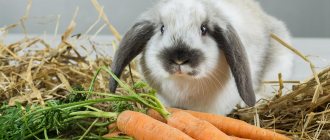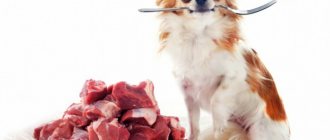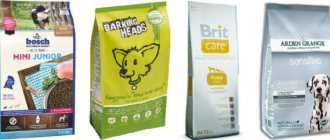The German Shepherd can rightfully be considered a universal breed. She can be a loyal, devoted friend, a good companion, an excellent watchdog and service dog, and perform many of the tasks assigned to her. Germans are smart, easy to learn and train, and easy to care for. Many people dream of having just such a dog. But before you bring home a four-legged friend, approach this issue responsibly. Feeding your German Shepherd is key to a long, healthy life. And although these dogs are undemanding in food, a large breed requires careful selection of diet and menu, which is quite troublesome and entails considerable expenses. A lot of specialized literature is devoted to the question of what to feed a German Shepherd, where proper feeding schemes are described in detail and there are even recipes for dishes.
Dry dog food
Dry food is one of the most popular types of food for German Shepherds.
It comes in a large bag, is easy to store and does not require refrigeration. The dry food contains all the essential nutrients that German Shepherds need and is tasty enough that dogs will want to eat this food at every meal. For picky eaters, dry food is available in many flavors and formulas. So almost every dog will find a brand they love. Dry food may not be the best food for older dogs that have difficulty eating hard kibble. You can add water to the dry kibble every time you feed your German Shepherd to soften the kibble.
Wet canned dog food
Wet canned food is a great option for owners of newly born German Shepherd puppies. Wet food is easier to chew and digest for a puppy who has recently been weaned from its mother.
Wet food contains up to 80% water and allows for faster digestion of nutrients, which is very important for such young puppies. The same goes for adult German Shepherds - fast absorption of nutrients is very beneficial.
Wet food has its pros and cons: it is not rancid, but it requires refrigeration. Another pro is that you can mix wet food with dry food to accommodate picky puppies.
Wet food has a more natural, meaty flavor that dogs enjoy. Mixing boring dry kibble with wet food makes eating more interesting!
Feeding a German Shepherd puppy: how and what to feed
Both ready-made food in the form of granulated dry food and food prepared from natural products are suitable for feeding a puppy. What type of food to give preference depends on what the baby ate from the previous owner and feed him according to the same scheme. If the owner decides to switch the puppy from dry food to natural feeding or vice versa, then this should be done gradually, since a sudden change in diet will cause digestive problems in the dog.
The transition from one diet to another should be gradual
Rules for feeding a puppy dry food
Many breeders and owners opt for industrial food, because high-quality dry food contains not only meat and vegetables, but also microelements necessary for the normal growth and development of a puppy.
In addition, the packaging of the finished food indicates the recommended daily portion of food for the baby, which relieves the owner of the need to independently calculate the dosage and ratio of products.
But when choosing this type of feeding, it is worth considering the following factors:
- Buy ready-made food designed specifically for puppies, not adult dogs;
- do not skimp on your small pet’s health by offering him cheap, economy-class food, because such food is made from low-quality ingredients and does not contain vitamins;
- Strictly follow the dosage of food indicated on the packaging. Dry pellets are quite high in calories and overfeeding pups at an early age will lead to the development of obesity in the future.
If the puppy does not finish the portion of food, this indicates that it is too large for him and should be reduced.
Features of feeding a puppy natural food
High-quality industrial food is not cheap, so many owners prepare food for their pet from natural products, saving their budget.
This type of feeding has its advantages: the owner is always confident in the freshness and quality of the ingredients, and the baby’s menu is much more varied than when feeding only dry granules.
What foods should be included in your puppy's diet:
- meat and offal (especially liver);
- milk and fermented milk products: cottage cheese, yogurt, kefir;
- eggs, both raw and boiled;
- fresh and raw vegetables;
- boiled sea fish;
- cereal porridge;
- fruits, berries and herbs in limited quantities.
Important: you cannot mix natural food with dry food in the same plate, because this can cause bloating and gastrointestinal diseases in puppies.
Semi-dry dog food
Semi-dry dog food, similar to wet canned food, is another option for picky eaters or dogs who have difficulty chewing dry food. Semi-dry food has a water content of 60% to 65%.
However, this is not the best option for all dogs due to the high levels of sugar, salt and chemicals in some brands. Be careful what brand you buy and how much salt and sugar is in your food.
Avoid cheap brands of semi-moist foods that fill them with chemical additives, preservatives and artificial colors. German Shepherds should not have any of these ingredients.
Features of feeding during pregnancy and after childbirth
A shepherd dog carrying offspring is fed three times a day, with food portions being increased by a third. To increase the intake of calcium and phosphorus, the dog is given fish 2-3 times a week, and the consumption of cheese and cottage cheese is increased. From the second half of pregnancy, the amount of vegetables and fruits increases. In winter, vitamins A and D are additionally introduced into the diet; in summer there is no shortage of them.
From the second month of gestation, meat products are completely replaced with fish products at the rate of 150 g of fish instead of 100 g of meat. In the last week of pregnancy, the dog is offered food at least 5 times a day.
During the postpartum period, the dog is given food at least 4 times. This should be special industrial or natural feed. A nursing shepherd dog is returned to its usual regimen and type of nutrition after it stops completely feeding its offspring. In the first days after birth, the mother’s diet should consist of fermented milk products when breastfed naturally. Until the second week, you should not give meat and fish to your dog. From the second week, the menu of a shepherd dog nursing babies should include calcium-containing dishes with vitamin supplements.
Dog breeders recommend giving lactating bitches milk porridge to enhance lactation, but if milk causes digestive disorders, diarrhea, or the dog refuses to eat it, the animal should not be forced.
Freeze Dried Dog Food
Freeze-dried food is a new concept in the dog food market. You're probably unlikely to find freeze-dried dog food in your grocery store or even a specialty pet store, but there are several brands available online.
Freeze-dried dog food is made from real prepared food that has been subjected to a special process to remove almost all of the water content. The result of this process is light and airy food, packaged in an airtight container for future use.
Freeze-dried dog food will last for years in undamaged packaging. How is this possible? Microorganisms need water to survive, so when all the water is removed from food, it does not risk spoiling.
When you are ready to feed your German Shepherd, simply open the bag and add some water to prepare the meal.
Frozen then thawed dog food
Frozen then thawed food can greatly improve or enhance your German Shepherd's health, but it requires intentionality, preparation, and safe handling.
Frozen foods should remain completely frozen even during the journey from store to home, whether cooked or raw. If you have a machine with a cooler, you can keep food frozen.
Unless you drive to the grocery store, keeping food frozen using freezer bags can be difficult and cumbersome, especially in warm weather. However, if you can get the food home safely, the benefits will be worth the effort.
Every day you need to defrost a portion of food for the next set of meals. Always defrost food in the refrigerator and allow it to thaw for 12 hours.
Frozen raw food comes in 2 forms: patties and medallions. The pies resemble large hamburger patties. Medallions resemble meatballs or slider pies. Both thaw at the same rate.
Experts say the benefits of frozen food make it one of the best options for German Shepherds (and dogs in general) due to its minimal processing. A minimally processed meat diet keeps dogs looking and feeling young with a long lifespan—ideal for the active German Shepherd.
Basic Rules
The diet of a German Shepherd should take into account not only the composition of the food and its calorie content, but also the amount of exercise and the temperament of the animal. If the dog is walked a lot and is physically and emotionally engaged, the extra calories will be burned easily. A large amount of fatty and carbohydrate foods will not harm such a pet. For a calm-tempered, sedentary shepherd dog, excess nutritious food is contraindicated.
It is important not to overfeed the dog, which can lead to a deterioration in general health, vascular diseases and obesity. Overeating is especially dangerous for pets that are excessively active after eating. The stomach of German Shepherds is too loose in the abdominal cavity and can become twisted under active loads.
Experienced dog owners are advised to adhere to the following rules:
- The German is given food twice a day, at the same time, in a slightly warm state;
- feeding is done only after a walk;
- the food should be thick - the shepherd’s stomach does not digest liquid food well;
- for the proper development of the dog’s musculoskeletal system, it is recommended to purchase a special stand that raises the bowl to chest level;
- make sure that the dog always has clean water;
- when refusing food, if the food remains untouched for half an hour, the bowl is removed;
- do not indulge in delicacies from the table;
- you are not allowed to growl when you touch the bowl, allowing the dog to feel superior to the owner;
- from an early age, accustom the dog to fresh vegetables;
- Fresh meat is preferable, but with the condition that the animal is regularly treated for worms.
How much and how often to feed
How much a German Shepherd eats per day depends on the animal’s age, activity, and the dog’s health.
How many times a day should you give your puppy food? A large amount of food at an early age will cause obesity in a dog within a year. Breeders recommend:
- in the absence of mother's milk, newborn puppies are given water on their own six times a day for a month;
- at 1-2 months the dog is given one glass of food, divided into portions, in 5 doses;
- from 2 to 3 months -1.5 glasses for 5 feedings;
- from 4 months to six months - fed with a liter of food, divided, as for young dogs, into 4 meals;
- further, up to a year - give 0.5 liters per day, feed 3 times a day.
At the age of one year, the dog is considered an adult; it is transferred to two meals a day, one and a half liters in volume. In summer, when it is hot, it is permissible to feed an adult dog once. After giving birth, a shepherd dog is fed often, at least 4-5 times a day.
An old or sedentary dog is given food 2-3 times a day. At the same time, the daily feed intake is not increased: a whole portion is given in the morning, half the norm in the afternoon and evening.
What can a German Shepherd do?
The German Shepherd's diet should contain from 50 to 70% protein food in the form of meat pulp, devoid of bones, fat and skin, offal, eggs, cottage cheese and milk. Carbohydrates are allowed 20-30%. These are cereals (porridges) and vegetables and fruits. Fats, animal and vegetable, need about 10-20%. It is better if it is unrefined vegetable oils.
For the correct formation of the skeleton, the shepherd dog must include mineral supplements containing bone meal, phytin and calcium in the menu.
Meat, fish, and vegetables can be given to your dog raw.
What not to do
Nutritional recommendations can be given by the breeder or club through which the dog was purchased. The following prohibited foods should be excluded from the menu:
- flour, including pasta;
- legumes;
- potato;
- sausages, frankfurters, smoked meats;
- raw river fish;
- pork;
- confectionery;
- pickles, pickled products;
- citrus;
- spices;
- grape;
- sorrel;
- small and sharp poultry bones are not digested by the body and damage the walls of the stomach and intestines.
Organic dog food
Organic food comes in a variety of forms to best suit your dog's preferences. For example, dry kibble for young German Shepherds full of energy.
Wet food for a senior German Shepherd with difficulty eating. Freeze dried foods for the German Shepherd owner who likes to stock up on food. Regardless of the type, organic is always best for your German Shepherd. Minimal processing means more nutrients are absorbed into your dog's body.
Dehydrated dog food
Dehydrated food is made from raw, natural ingredients that are minimally processed and then slowly dehydrated of their water content. Warm air removes moisture from food. Without any preservatives in the food, your dog gets all the nutrients and enzymes he needs.
Dehydrated food differs from freeze-dried food in that dehydrated food uses warm air to remove moisture vapor, while freeze-dried food uses extremely low temperatures to turn liquid into a solid—without the vapor.
As with freeze-dried food, dehydrated food only needs a quantity of water to reconstitute it and prepare it for consumption. These types of food are great for dog owners who live in areas with frequent natural disasters. The food is lightweight, sealed and can be stored for 10 years, so people can pack it in emergency kits if a family has to evacuate due to weather.
Menu for the week (table)
| Day of the week | Daily diet |
| Monday | Carrot salad with sour cream, rye croutons, beef, oatmeal, egg yolk |
| Tuesday | Curdled milk, light cookies, boiled liver, baked pumpkin |
| Wednesday | Ryazhenka, boiled fish, buckwheat porridge, vegetable oil, herbs |
| Thursday | Low-fat cheese, dried fruits, boiled chicken, cabbage and zucchini |
| Friday | Low-fat cottage cheese, boiled beef kidneys, buckwheat and carrots, apple |
| Saturday | Curdled milk, croutons, boiled veal heart, rice, rutabaga, greens |
| Sunday | Ryazhenka, apple, sunflower oil, oatmeal, zucchini stewed with carrots, tomatoes, herbs and butter, chicken necks |











